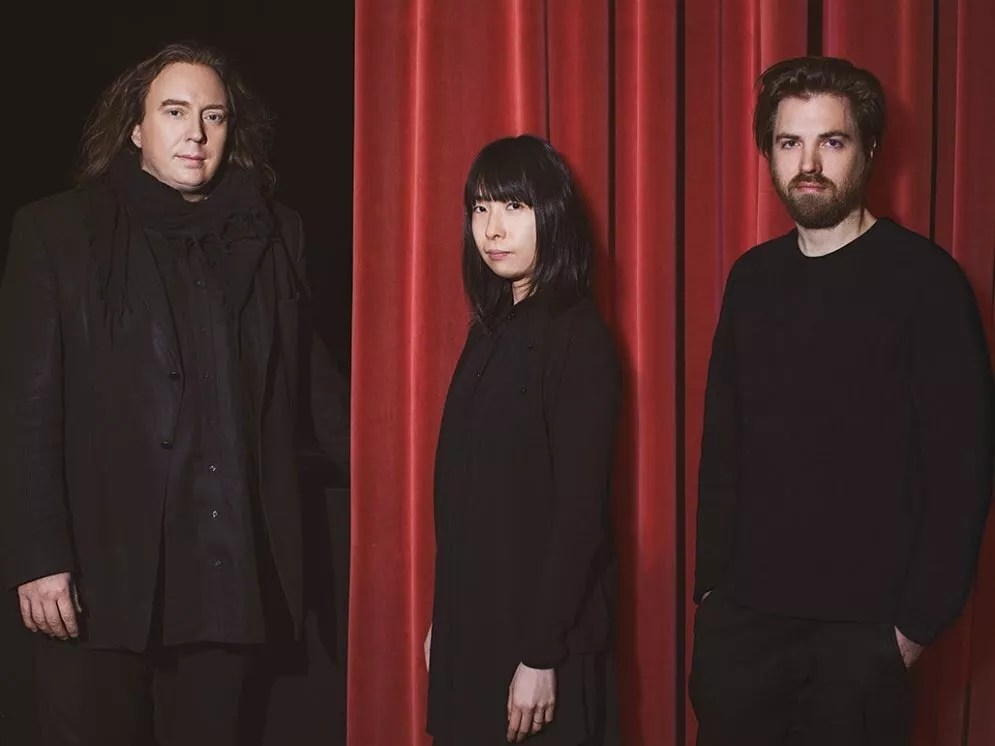
Photo by Katja Ruge/Eastgate

Audio By Carbonatix
For all intents and purposes, Tangerine Dream should have ended long ago. The pioneering electronic music band formed in 1967 and has only had one consistent member, founder Edgar Froese. But when he died suddenly in 2015, the remaining musicians refused to call it quits.
“It was not our decision to move on. There was no one raising hands saying, ‘I’m going to do this,'” Thorsten Quaeschning, the band’s current leader, says from his studio in Berlin. “It was the plan of Edgar because he made plans and structures for every possible situation and option. So the idea was Tangerine Dream itself is stronger, and the philosophical idea behind Tangerine Dream is stronger than individual members. It could move on for many years and last probably a hundred years or longer because the idea and the music are strong.”
None of the current members – Quaeschning, Hoshiko Yamane, and Paul Frick, all classically trained musicians – were alive when the band was formed, and Quaeschning had never programmed a sequencer before Froese taught him. But they’ve kept the band going, animated by the principles of its late founder. They’re about to embark on their first North American tour since Froese’s passing, starting on Friday, September 8, at the Miami Beach Bandshell.
Froese, who formed Tangerine Dream amid the countercultural, psychedelic music scene in late 1960s West Berlin, believed the group was defined less by its membership and more by its core ideas. The band’s famous records of the ’70s and ’80s, Phaedra and Hyperborea, explored the possibilities of the new musical technology of the day, the modular synthesizer and the sequencer, through evocative soundscapes that sound as dreamlike and mysterious now as they did then. Froese coined the term “kosmische musik” (“cosmic music”) to describe the Tangerine Dream sound, differentiating the band from its rock-leaning contemporaries such as Neu! and Can.
“There was no blueprint for it because you couldn’t just search on Spotify for a ‘best synthesizer’ playlist and hear what other people did – because no one had one,” Quaeschning explains. “You had to figure out what the synthesizer could do, maybe should do, by yourself.”
After 146 albums and 56 years, there is definitely a blueprint, and Froese certainly deserves credit for sketching it out. Today, Tangerine Dream’s music, which includes scoring work for movies like Thief and Risky Business, is celebrated for legitimizing the synthesizer as a serious artistic tool and influencing a generation of musicians to pick them up. Its melodic, spacy aesthetic, which defined the then-futuristic sound of the band’s 1980s peak, has been revived by a new generation of ambient and electronic composers, from Caterina Barbieri to Oneohtrix Point Never, to say nothing of the entire new age genre. And anyone who’s ever listened to a synth-wave mix on YouTube or zoned out to Survive’s Stranger Things score owes them gratitude.
Many of the band’s contemporaries have also seen reissues and reappraisal, such as fellow cinematic mainstays like John Carpenter and Vangelis. Former member Klaus Schulze worked with Hans Zimmer on the soundtrack to Dune and completed one final album, Deus Arrakis, before dying last year. Froese made one hell of a last stand: His final major project was the score to Grand Theft Auto V, the highest-selling video game of all time. Even Quaeschning, who worked on the project, remains awed by the scale and particularities of scoring such a massive piece of entertainment.
“There’s so many different parameters. That’s the difference [compared] to scoring a movie. It’s not your choice or your decision [as to] how long the player is hearing one section because someone can finish one episode inside the game in five minutes, another person needs two weeks,” Quaeschning adds. “You can’t do the Tetris, Super Mario thing anymore where the same melodies play from level one to the end. The person would hear the same melody for two weeks. It’s kind of like, throw in some motifs and atmospheres and try not to give them the big Gone With the Wind main melody thing right on the nose all the time because it would be too boring. You have to find the atmosphere and keep in mind that maybe someone’s going to hear it for months or weeks.”
(On whether the band will be back for Grand Theft Auto VI: “I’m not sure all decisions are made to that point.”)
Shepherding that immense legacy is now the band’s goal, and to the current members, that means refusing to luxuriate it. “The idea is not to be some kind of musical museum, just try to find the next chord progression,” Quaeschning says. The core idea of the band is sequencer-driven music; beyond that, anything goes. They’re not purists about analog equipment or certain technologies – they use everything available, with little to no separation between analog, digital, or modular. The goal is to get “as near to the sound in your head” as possible.
The new era of Tangerine Dream has already produced exciting work. The group used Froese’s immense archive as a reference point for their 2022 album Raum, a stunning record that modernizes their classic sound. But the band’s process is perhaps epitomized in its live shows, once famed for the massive stacks of equipment onstage, which always end with a semi-improvised “session.” They decide on a root key and a tempo, and from there, they take off.
“There are Tangerine Dream rules we follow, and we try to combine this with the feel of the room and the ambient audience and what we did the day before or the day itself. Just to create music out of the moment,” Quaeschning says.
Tangerine Dream. 8 p.m. Friday, September 8, at Miami Beach Bandshell, 7275 Collins Ave., Miami Beach; 786-453-2897; miamibeachbandshell.com. Tickets cost $38.11 via dice.fm.